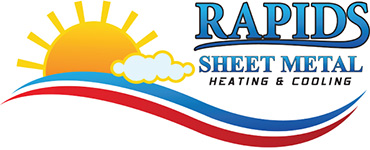
If you’re questioning whether your Wisconsin Rapids home has unhealthy indoor air quality (IAQ), it probably does.
We are indoors a lot. As a matter of fact, we’re in a building up to 90% of the time, according to the U.S. Environmental Protection Agency. And the air inside houses could be 2–5 times worse than outdoors, which might create long-term health concerns.
Most Common Origins of Bad IAQ
We’ve made a list of the most common causes of inferior IAQ, the problems they make and how you can remedy these indoor air pollutants. If you’re troubled by the air inside your residence, we advise talking with a expert like Rapids Sheet Metal Works Inc about which options are best for your home.
Volatile Organic Compounds
Volatile organic compounds, or VOCs, are chemicals emitted from everyday household things.
They’re found in paint and stains as well as:
- Furniture
- Carpet
- Building materials
- Cleaning products
- Cosmetics
- Air fresheners
- Candles
When these vapors accumulate inside, they may irritate your eyes, nose and throat. They may also create headaches and nausea. Regardless of whether your residence is in a rural or industrial space, an EPA study found indoor levels of these pollutants can be 2–5 times greater than the air outside your home.
Always follow the manufacturer’s directions when painting or cleaning. Cracking a window can help fumes dissipate faster.
Air purification systems can also make it better. This system partners with your heating and cooling unit to enhance indoor air. When hunting for a model, ensure it’s specifically created to eradicate VOCs.
Dust and Pet Dander
Dust and pet dander can aggravate health problems like asthma and allergies, especially when it continuously gets recirculated by your house’s comfort system. While you can vacuum more routinely and buy an improved air filter, an air filtration system may be a better fit.
This solution hooks to your comfort equipment to provide powerful filtration. Some types offer hospital-level filtration for eliminating particles and bioaerosols.
Lasting Odors
Modern houses are securely sealed to boost energy efficiency. While this is great for your heating and cooling bill, it’s not so good for your IAQ.
Stale odors can hang around for a greater amount of time since your home is pulling in a smaller amount of fresh air. Since keeping your windows open throughout the year isn’t an option, here are two approaches you can make your indoor air smell cleaner.
An air purification system is put in your ductwork to neutralize odors before they are redistributed. Search for one with a carbon filter and the capability to wipe out damaging VOCs. This equipment can also help keep your loved ones healthy by wiping out most bacteria and normal allergy triggers like pollen and mold spores.
A ventilation system removes musty indoor air and substitutes it with clean outdoor air. There are two types of equipment (heat recovery and energy recovery), so ask our professionals for more info on which type is best for your home.
Unsteady Humidity
It’s important your residence’s humidity keeps even. Air that’s too moist can lead to mold, while dry air can create respiratory issues.
Our technicians suggest 40–50% for ideal comfort. To keep yours in balance, think over getting a whole-home humidifier or whole-home dehumidifier with your HVAC equipment.
Instead of having to pull a humidifier from room to room, this product delivers balanced humidity throughout your house.
Carbon Monoxide
Carbon monoxide is colorless gas you can’t smell. It’s caused by insufficient combustion in fuel-burning units, like gas heating systems, water heaters or fireplaces.
It creates a severe health risk. In little levels, it can lead to flu-like symptoms like headaches and nausea. It could be fatal in heavy amounts.
We suggest yearly furnace maintenance to ensure your system is operating like it should. This job allows our techs to see issues before they start, including malfunctions that can create carbon monoxide leaks.
The best way to keep your residence free of carbon monoxide is to put in detectors. These alarms need to be on all floors near bedrooms and living spaces.
Enhance Your Home’s Air Quality with the Rapids Sheet Metal Works Inc Professionals
Informed that your house has inferior air quality but not sure how to make it better? Or unsure which product is a good fit for you? Give our approachable HVAC professionals a call at 715-564-8958 or contact us online today. With free estimates and professional service, we’ll help you locate the best equipment for your home and budget.
